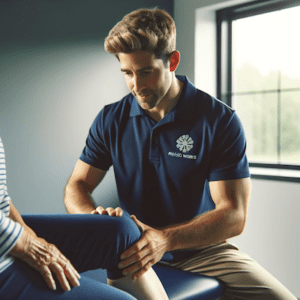Improving Ageing Knees: Insights from a Knee Physiotherapist
Knee pain affects people of all ages, stemming from various conditions and injuries. From the exuberance of youth to the wisdom of older age, the knee is a critical joint that can encounter issues at any stage of life.
Early Signs and Youthful Strides
In children and teenagers, knee pain often arises from conditions like Osgood Schlatters, patellofemoral pain, or injuries. These issues, while temporary, need timely intervention to ensure a swift return to activities or sports. Physiotherapists play a vital role in this journey, offering tailored treatments to alleviate pain and prevent future problems. Juvenile Chronic Arthritis is another concern, marked by a swollen, sometimes red joint, necessitating specialist care.
The Active Adult Years
Adults in their twenties and thirties frequently face knee pain due to injuries from sports or physically demanding work. Ligament tears, cartilage damage, muscle strains, and tendon injuries are common culprits. Early assessment and treatment by a physiotherapist are crucial to avoid further damage and reduce the risk of developing Osteoarthritis later in life. Recognising symptoms like significant pain, swelling, or instability in the knee is the first step towards recovery.
Navigating Later Life
As we age, knee pain can emerge even without an injury history, a reflection of the natural degenerative changes in our joints. This is often Osteoarthritis, characterised by pain during weight-bearing activities, especially those involving twisting movements. Although some may show significant signs of osteoarthritis on X-rays with little pain, others might experience considerable discomfort with minimal evidence of the condition. Treatment and a physiotherapist-designed exercise program can help manage symptoms, improve function, and maintain an active lifestyle.

How Do You Keep Your Knees Strong As You Age?
Keeping your knees strong as you age is crucial for maintaining mobility, independence, and a high quality of life. Here are practical tips to help you maintain or improve the strength and health of your knees:
1. Stay Active
Regular physical activity is essential. Focus on low-impact exercises that minimise stress on your knees, such as walking, swimming, or cycling. These activities help keep your joints flexible and muscles strong.
2. Strengthen Your Muscles
Strengthening the muscles around your knees will help support and protect the joints. Target your quadriceps, hamstrings, and calf muscles with exercises like squats, leg lifts, and lunges. Remember to start slow and increase intensity gradually.
3. Maintain a Healthy Weight
Extra weight puts additional pressure on your knees. Maintaining a healthy weight can reduce the stress on your knee joints and minimise the risk of osteoarthritis and other knee problems.
4. Eat a Nutritious Diet
A diet rich in vitamins and minerals, especially calcium and vitamin D, can help keep your bones strong. Incorporate foods like dairy products, leafy greens, and fish into your diet. Omega-3 fatty acids, found in fish and flaxseeds, may also help reduce joint inflammation.
5. Stay Flexible
Flexibility exercises and stretching can help maintain the range of motion in your knee joints. Consider incorporating yoga or Pilates into your routine, focusing on gentle stretching and flexibility exercises.
6. Wear Proper Footwear
Supportive shoes that fit well can help align your knees and prevent injuries. Consider orthotic insoles if you have flat feet or other foot issues that affect your knee alignment.
7. Protect Your Knees
Use knee pads if you engage in activities that put your knees at risk, such as gardening or certain sports. Learn proper techniques to avoid putting unnecessary stress on your knees.
8. Listen to Your Body
Pay attention to knee pain. If you experience persistent pain, swelling, or stiffness in your knees, consult a healthcare professional. Early intervention can prevent further damage.
9. Consider Physiotherapy
A physiotherapist can design a personalised exercise program to strengthen your knees, improve flexibility, and reduce pain. They can also provide advice on proper movement techniques.
10. Stay Hydrated
Adequate hydration is important for joint health. Drinking plenty of water helps keep your cartilage soft and hydrated, which is crucial for absorbing shocks and reducing joint pain.
When to Consider Knee Replacement Surgery?
For those where conservative management isn’t enough, knee replacement surgery might be the next step. This procedure has high success rates but requires diligent post-operative rehabilitation for the best outcomes. PhysioWorks offers same-day appointments to kickstart your journey to recovery, with physiotherapists specializing in knee rehabilitation ready to guide you back to your passions.
What to Do?
If you’re experiencing knee pain, don’t hesitate to seek professional advice from your physiotherapist. They can assess your knee, identify the root cause of your pain, and develop a personalized treatment plan. Your journey to knee health is a partnership with your physiotherapist, aimed at restoring your strength, function, and pain-free movement.
Conclusion
Knee pain spans across the ages, but with the right knowledge and support from a physiotherapist, managing and overcoming this discomfort is achievable. Whether you’re young, an active adult, or navigating the challenges of older age, your knee health is vital for maintaining an active and fulfilling life. Remember, early intervention is key to a quick and successful recovery.
Taking proactive steps to keep your knees strong as you age is vital. Combining regular exercise, a healthy diet, and preventive care can help you maintain knee strength, flexibility, and function. Remember, it’s never too late to start caring for your knees, and small, consistent efforts can make a significant difference in your overall knee health.
Related Articles
- Knee Arthritis – Osteoarthritis: Learn about the symptoms of knee osteoarthritis and how physiotherapy can help manage the condition.
- Patellofemoral Pain Syndrome: Discover strategies for managing patellofemoral pain, including exercises and physiotherapy techniques.
- Meniscus Tear: Find out about the causes, symptoms, and treatment options for meniscus tears in the knee.
- ACL Injury and Rehabilitation: Gain insights into anterior cruciate ligament (ACL) injuries, prevention tips, and rehabilitation processes.
- Knee Replacement Physiotherapy: Understand the role of physiotherapy in recovering from knee replacement surgery, including exercises and mobility improvement strategies.
- Managing Chronic Knee Pain: Learn about long-term strategies for dealing with chronic knee pain, including lifestyle changes and physiotherapy interventions.
- Preventing Knee Injuries in Sports: Get tips on how to protect your knees from injuries while participating in sports activities.
- Knee Braces and Supports: Discover how knee braces and supports can aid in the treatment and prevention of knee injuries.



